Researchers Find Strain of Variant AIDS Virus
- Share via
Scientists have discovered a strain of a variant AIDS virus that apparently does not kill the cells it infects when tested in the laboratory. The new finding about the strain of West African virus known as HIV-2 may help to explain why HIV-2 appears to cause disease less frequently than the original AIDS virus.
The new data are being reported today in the journal Science by a research team headed by Dr. Jay Levy of the UC Medical Center, San Francisco. “We predict this strain of HIV-2 might help in the eventual development of an AIDS vaccine,” Levy said.
The finding appears to shatter a common assumption that the human immunodeficiency viruses wreak havoc primarily by killing the cells they infect. It reinforces the view that they may also cause immune system damage by remaining in cells for long periods of time and interfering with the disease-fighting function of the cells.
“Even though the newly found strain does not kill cells, it appears to cause disease just like the strains that do kill cells,” Levy said.
36,000 Americans Killed
HIV-2 is a sub-type of the HIV-1 virus, which has killed nearly 36,000 Americans. HIV-2 to date has been found in only one person in the United States and appears limited to patients in West Africa and parts of Europe.
In the same issue of Science, researchers from the University of Alabama, Birmingham, report detecting a similar strain of HIV-2 in West Africa.
“The implication is that HIV-2, and perhaps HIV-1, can disrupt the immune system and cause disease without killing cells,” Levy said.
In a related development, researchers at the Dana-Farber Cancer Institute of Harvard Medical School reported that HIV-1 may have evolved within the last 40 to 100 years from HIV-2. The study was based on a detailed analysis of the gene sequences for a variety of immunodeficiency viruses from humans and monkeys.
The method of analysis could not determine whether an ancestral AIDS jumped from monkeys to humans or vice versa, according to Dr. Temple Smith, principal author of the study.
The work follows a study published last week that suggested an ancestral AIDS virus infected the primitive ancestors of humans and monkeys more than 20 million years ago. Smith said he doubts that conclusion.





